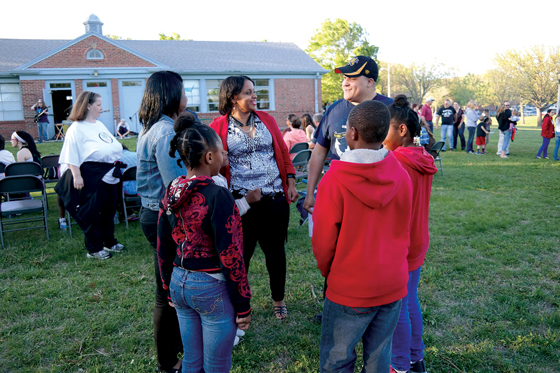The Kansas Health Foundation has awarded the Hugo Wall School of Public Affairs at Wichita State University and the WSU Foundation a grant of $250,000 as part of its Community Engagement Initiative, which seeks to help Kansas residents develop plans to improve their communities.
The grant funds will be used by the Shocker Neighborhood Coalition, led by the Hugo Wall School of Public Affairs, to improve safety and quality of life in neighborhoods surrounding Wichita State, starting with the area south of campus known as the Fairmount neighborhood.
The Hugo Wall School, part of Fairmount College of Liberal Arts and Sciences, is home to the Master of Public Administration degree, the Center for Urban Studies and the Kansas Public Finance Center.
WSU President John Bardo launched what he called the “Enough is Enough” task force last December to try to create safe, economically vibrant neighborhoods around campus. That action came after a brutal assault in Fairmount Park in November resulted in the death of Leticia Davis, a mother of four. The Hugo Wall School joined with several partners, including the Fairmount Neighborhood Association, to submit the grant application on behalf of the Shocker Neighborhood Coalition.
“The grant will give us the resources we need to really think about how we can support the neighborhood, eliminate barriers and help spark some energy back into the community,” says Misty Bruckner, director of the Hugo Wall School’s Public Policy and Management Center.
The intent of the grant is to help citizens create better communities, says Jeff Willett, vice president for programs and advocacy for the Kansas Health Foundation.
“It’s clear that Wichita State is committed to engaging and empowering residents of the Fairmount neighborhood to identify their vision for a healthy community and to achieve that vision,” Willett says.
The Shocker Neighborhood Coalition’s first step will be to hire a project assistant to take charge of day-to-day activities, including setting up meetings with Fairmount neighborhood residents to learn what improvements they want to make. The project assistant will work with partners to make projects happen. The Kansas Health Foundation’s grant will provide up to an additional $100,000 to match funds that partners invest.
Although the grant covers the Fairmount neighborhood, with boundaries considered to be 9th to 17th streets and Hillside to Oliver, the coalition hopes the model it develops can be applied to other neighborhoods surrounding the campus, Bruckner says.
She hopes WSU students and faculty will participate in the process.
“This is a real-world practicum right next to campus, offering an environment where applied learning can take place for a variety of disciplines,” Bruckner says.
She notes that the coalition will build on work the Fairmount Neighborhood Association already is doing. Darryl Carrington, association president, said the organization was excited to learn more about the grant at a recent coalition meeting.
“I can’t tell you how satisfying it is to all of us to see the attention that is being placed on the Fairmount neighborhood, which has such important historical connections to the university,” he says.


 Glenn Gunnels
Glenn Gunnels